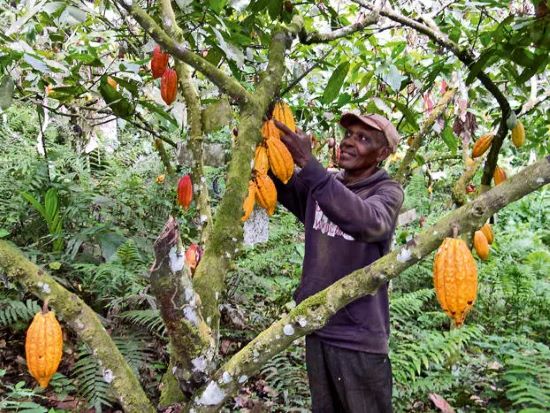The world’s love for chocolate is being threatened, and the people who grow its key ingredient—cacao or cocoa —are bearing the brunt of climate change.
In West Africa, where 70% of the world’s cacao is produced, rising temperatures and erratic rainfall are making it harder for farmers to cultivate the crop that fuels a multi-billion-dollar industry. A new study by Climate Central has found that human-caused climate change has made extreme heat 10 times more likely in the region, intensifying the crisis for farmers and pushing cocoa prices up by 400% in recent years.
Over the past decade, West Africa’s cacao-growing regions—stretching across Cameroon, Côte d’Ivoire, Ghana, and Nigeria—have seen a sharp increase in the number of days where temperatures exceed 32°C, the upper limit for healthy cacao growth. The study found that nearly all cacao-producing areas in these countries experienced at least three additional weeks of extreme heat per year due to global warming, with some areas facing even longer heatwaves.
More than just heat: A perfect storm for cocoa farmers
The challenges don’t stop at rising temperatures. Climate change is also disrupting rainfall patterns, degrading soil quality, and making cacao trees more vulnerable to pests and diseases like the cacao swollen shoot virus (CSSV), which spreads through mealybug infestations. At the same time, illegal mining and smuggling are compounding the crisis, reducing both the quality and quantity of cocoa harvests.
In 2024 alone, two-thirds of the cacao-producing regions analyzed in the study recorded at least six additional weeks of extreme heat. In nearly every major cacao-growing district, the main crop cycle—when the bulk of the cocoa is harvested—was hit harder than the mid-crop cycle.
Voices from the frontlines: Farmers, advocates, and chocolatiers speak out
As the crisis worsens, experts and industry players are raising the alarm. Mohamed Adow, Director of Power Shift Africa, stressed the urgent need for action:
“This is yet another example of how African livelihoods are under threat from extreme weather caused by carbon pollution. We need a faster transition to clean energy and stronger financial support for African farmers to help them adapt.”
International charity Christian Aid also warned that both chocolate and the millions of people who rely on cacao farming are at risk. The organization is calling for immediate action to reduce emissions and ensure climate finance reaches cocoa growers.
For chocolatiers, the impact is already being felt. Andy Soden of Kernow Chocolate described the situation as dire:
“It’s a nightmare. No business in the chocolate industry has been spared, and it’s all because of climate change.”
A future at risk
West Africa’s cocoa crisis is more than just a supply chain issue—it’s a human story of farmers struggling to survive as climate change reshapes their environment. Without urgent intervention, the world may face not just pricier chocolate, but a future where this beloved treat becomes far less accessible.
For cocoa farmers across the region, the question remains: will the world act in time to save their livelihoods—and our chocolate?


